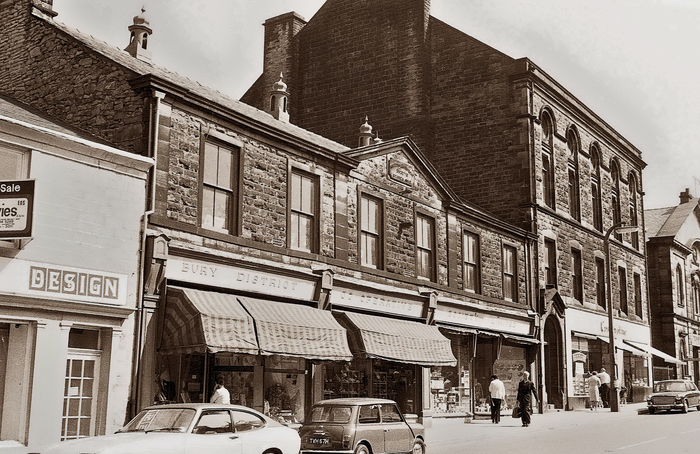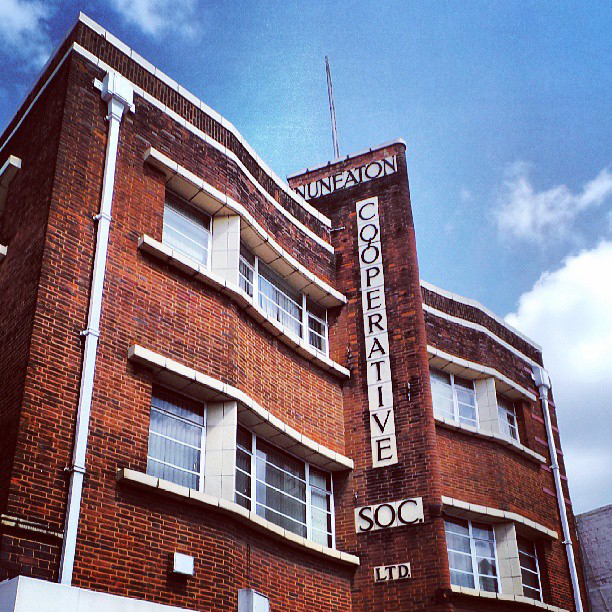Campaigners in Hull are celebrating after the council suggested the iconic and listed Three Ships Co-op mural is to be saved from demolition.
The 1963 mosaic was designed by artist Alan Boyson on the outside wall of a Hull & East Riding Co-operative Society, which was later occupied by BHS. The building was earmarked for demolition as part of a £120m city centre redevelopment and the council had ruled that asbestos levels meant it was too dangerous to preserve the mural.
Related: Three Ships mural earmarked for demolition
The news prompted campaigners Hull Heritage Action Group (HHAG) to gather a 7,000 name petition and win grade-II Listing for the mural – a glass mosaic, set into a curved concrete screen, depicting three trawlers, in tribute to the area’s maritime industry.
Now the council says it is hoping for a solution. Director of regeneration, Mark Jones, said: “We hope to have found a way to save and restore the mural and then incorporate it into revised designs, which we will be submitting for planning permission later this year.”
The rescue plan for the mural wold involve detaching its steel frame from the rest of the building before demolition, leaving the artwork in place for incorporation into the replacement site, a residential and office development. A fish mural inside the building would also be saved under this plan but there is still uncertainty over the fate of a third mural.
But the council warns there are still questions about the cost of the plan.
HHAG said: “We are absolutely delighted to hear that such significant progress is being made … The journey this past year and a half – from the presumption that the mural needed to be urgently demolished in the interest of public safety – is incredible.
Related: Co-op architecture: How the movement changed England
“We applaud the efforts being made by everyone involved at Hull City Countil to ensure that this magnificent artwork is preserved for future generations.”
“We would like to acknowledge the support and participation of the many organisations and individuals who have been vocal about the mural’s importance … Grade II protection shows the value of listing, which ensures that matters are reconsidered when destruction is at hand.
“We will continue to actively monitor Hull City Council’s endeavours to incorporate the original Three Ships mosaic in a meaningful and appropriate way into the new development, and we look forward to being involved as stakeholders in the process.”
Meanwhile, another architectural piece of co-op history has won protected status.
Ramsbottom Co-op Hall, in Greater Manchester, has won Grade II listed status after campaigners warned it was at risk from developers.
The listing from Historic England means the building is of “special interest” and “warrants every effort to preserve it”.

The theatre is an early example of the Co-operative Halls built for working class communities. Built by the Ramsbottom Industrial and Provident Society in 1876, it retains a number of original features, including paintwork.
Seating 800 people, it was the main venue in Ramsbottom, feature a three side gallery around the fourth wall stage. The gallery together and decorative iron columns still exist, as do the upper columns and hammer beams carrying the basket-arched roof trusses, and original boarded ceiling and cast-iron ventilator sunburners.
According the the Theatres Trust website, the hall was originally used for music hall variety as well as lectures, guild meetings, temperance services and grand concerts.
During the 1920s it was used by traveling theatre groups and players. The Co-operative Wholesale Society ran promotional films and smoking concerts in the 1930s.
During World War II it was used as an army training centre and the seating removed, although the balcony level tiering still remains. In 1944 it was taken over by the Labour Exchange and has remained unused since.
Theatres Trust director Jon Morgan said: “We are delighted by the decision, which gives this rare building greater protection from irreversible redevelopment.
“We believe Ramsbottom Co-op Hall has a viable future as a venue for its community.”
And work is being done to preserve the art deco section the former HQ of the Heart of England Co-op, in Nuneaton, Warwickshire.

The third floor of the former Nuneaton Co-op department store building is being turned into a business hub. Contractors will repair exterior brickwork, preserve external finishes and renew the doors and windows.
The government has granted nearly £900,000 to the scheme to regenerate the town centre, to pay for the refurbishment of the co-op building.
The building, first occupied by Nuneaton Co-op in 1929, was sold to Nuneaton and Bedworth Borough Council by Heart of England in 2019.
Heart of England closed its department store at the site in 2016 as part of its decision to close loss-making non-food stores across its trading area.

